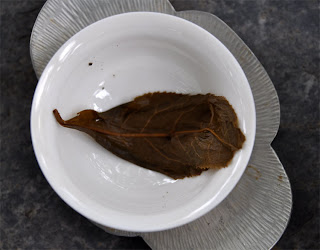How do you learn best about tea? Reading books and blogs is a great help, as it gives us access to a lot of information and techniques. However, at the core, tea is a pleasure that is best experienced, not described. Nowadays, tasters prefer to write very detailed tasting notes that resemble wine reviews: a price or score sums up the tea. Ancient Chinese scholars, on the other hand, would often use poetry to translate their feelings. The beauty of their words still resonates with us today. But one wonders: were these literati exaggerating when they described their tea experiences in such divine terms? As long as you haven't experienced a 'perfect' tea moment you can't really relate to these poems other than on a literary level.
One of the most hyped and mythical teas, nowadays, is raw old puerh. At auctions in China, collectors pay several times the price of gold for such leaves. While such price seems exaggerated from the standpoint of our my own finances, I had the privilege to drink such puerhs on a couple of occasions and it felt like paradise! The closest puerhs I found and put on my list are 2 puerhs around 40 years old. Their main drawback is that they are still quite pricy. With this 25 years old raw loose puerh, I'm glad that I can make a similar experience much more affordable!
This raw loose puerh was originally purchased by the Menghai Tea factory. It is an unblended and unsorted harvest from high altitude, old arbor puerh trees. The exact origin of this Mao Cha is unknown. Next, it was purchased by a Taiwanese tea seller who stored it very well, in a clean environment.
In the 80s, puerh tea factories would usually start by sorting the leaves according to their size before blending different areas and sizes according to their own recipes. Here, we have leaves that are unsorted. This means that this loose puerh contains buds, big leaves, branches... This provides a healthy natural mix for the tea to age well.
This tea achieves excellence on the 2 characteristics that we strive at with an old puerh: the wooden old scents and the fresh, pure taste!
It is like silk on the tongue, refreshing and lively! The taste is powerful, mind blowing and never ending. The fragrances are intoxicating and complex like Cognac. Energy pure tickles my tongue and warms my whole body.
It's a tea that can be brewed to its last drop. These leaves have so much to teach about why old puerh is so sought after... but it has to be experienced...
This pavilion in the Lin Garden's Banyan Shade Pond is a wonderful spot to enjoy this puerh. The bench even lets you view the pond below your feet. It gives you a feeling of floating in the air, between water and mountain.
And higher I fly
joining the white dragons
on my cup of tea
Note: the 2 Dehua porcelain cups have '3D' dragons pressed on their exterior walls.
Gedicht von Feuer und Flamme – 3
13 hours ago












9 comments:
Quel cadre et un voyage dans le Temps de tous les instants.
Merci pour ce partage;c'est bien toi notre meilleur représentant moderne d'une forme poétique&réaliste du Thé.
Et en effet rien ne vaut l'expérience...
Mes amitiés.
à bientôt.
Philippe,
Merci pour ce gentil commentaire.
I was fortunate enough to be a guest of a couple of gong fu cha sessions, where very aged puerh was brewed, and the experience was pure magic, a sort of spiritual trip. I still remember the intense cha qi feeling running through all my pores; Now I understand why his particular tea comes with such a hefty price tag.
Merci Stéphane pour ces images toujours plus belles les unes que les autres. Elles sont d'autant plus agréables que je les admire en dégustant le Gao Shan Tsui Feng de l'hiver 2010, gracieuseté de ta part reçue avec ma commande de thés du printemps 2011. Ceux-ci sont très appréciés pour leur finesse et leur notes enivrantes, comme le sont tous les printemps des hautes cimes du terroir taïwanais.
Merci pour la rapidité d'envoi qui transforme un lundi banal en matin de Noël.
Merci de nous donner accès à ces trésors en plus de tes sages et discrètes recommandations.
Hélène
I think that the idea of creating poetry or other more artistic expression to describe tea is a wonderful and beautiful idea. This is one reason I love the blog Tea Musings, which often is not directly about tea, and never includes straightforward reviews or even mentions of specific tea...it touches tea tangentially, but perhaps embodies it in a much deeper way than most blogs.
This probably sounds strange coming from someone who is the architect behind RateTea.net, but I too am very skeptical of numbers and dry, written reviews. Yes, I write them, but my main motivation is to draw in casual tea drinkers, people who shop in the supermarket, who drink the mainstream, mass-produced brands, and give them a glimpse of something else. Most of the time, I don't want to write about tea in this way...instead I'd rather just experience it, and instead write about whatever I feel inspired to write about.
.."I'd rather just experience it, and instead write about whatever I feel inspired to write about."
Like x3 :)
Thank you for sharing your experience, Gerard.
Je suis heureux que mes thés te fassent tant plaisir, Hélène, et te souhaite encore de nombreuses dégustations pleines de bonheur.
Thanks for sharing your inspirations with us, Alex.
The best word I can come up with to describe this tea is "revelatory." Some might focus on the incredible taste, others on the energy it spreads throughout your body. To me, the most important characteristic is joy -- the joy I feel drinking this, knowing that it's truly what puerh is meant to be. Thanks, Stephane for this amazing experience.
Post a Comment